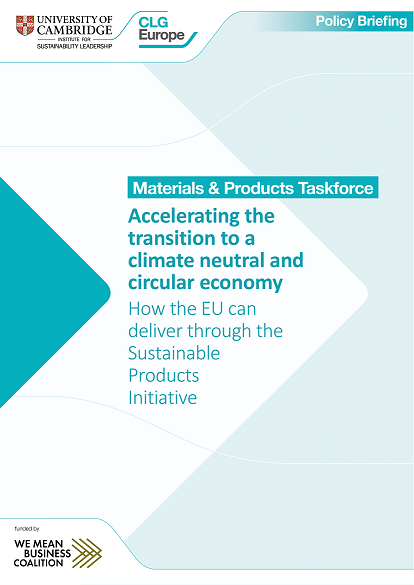
16 December 2021 - The new policy briefing from the Taskforce for climate neutral and circular materials and Products highlights its recommendations for the upcoming Sustainable Products Initiative.
Read the full briefing.
Find out more about the Materials and Products Taskforce.
About the policy briefing:
The Taskforce for climate neutral and circular materials and products, a new business grouping working to accelerate this transition, aims to support the key objectives as set out through the EU Green Deal and the Circular Economy Action Plan. The Sustainable Products Initaitve is an upcoming piece of legislation that serves as one of the key flagship policy proposals.
The purpose of this briefing is to provide policy recommendations on the upcoming Sustainable Products Initiative from a progressive business perspective.
Key findings of the policy briefing:
The Taskforce supports the introduction of a holistic and ambitious piece of legislation that embodies the following five principles:
- Be ambitious in its aims in delivering the Green Deal
- Build a progressive policy framework based upon competitive sustainability
- Improve transparency of product sustainability
- Support innovation and be future-proof
- Provide policy coherence across the wider EU industrial and climate initiatives.
The Taskforce also sets the following policy recommendations that the Sustainable Products Initiative should seek to deliver:
- Implement measures that support EU manufacturers and producers in their journey towards decarbonisation and circularity, notably by putting declining limits on embedded life cycle emissions for the most CO2-intensive, materials-rich, final products.
- Strengthen embedded CO2 reporting requirements and materials passporting requirements, and also adopt standardized CO2 rating labels for the most CO2-intensive inputs into key value chains, whilst making this process practical for companies.
- Set minimum recycled content, reuse or reduced use of virgin raw materials requirements for key materials-intensive sectors, such as buildings, vehicles and packaging.
- Set cross-cutting requirements to ensure that low carbon and circular public procurement requirements are placed in all future revisions of EU sector legislation for key sectors (especially for buildings, vehicles, public works and infrastructure).
- Reform the rules regarding the EU standard setting process for construction products (particularly cement and concrete), working alongside the upcoming Construction Products Regulation and under the Eurocodes.
- Establish an ambitious scope for the SPI, working with accompanying legislation to include as many sectors as possible based upon an assessment of the most carbon- and resource-intensive products. This could include new buildings and construction projects, automotive and packaging.
Martin Porter, Senior Strategic Adviser to CLG Europe and Executive Chair in Brussels for CISL, said: “To accelerate competitive sustainability in Europe in the global race to zero, European industrial policy needs to enable the faster expansion of low carbon and carbon neutral products & materials. The long anticipated Sustainable Products Initiative should be ambitious in its aims to deliver the European Green Deal and coherent across wider EU industrial and climate initiatives to provide the certainty businesses need to scale up their actions towards net zero economies.”
María Mendiluce, CEO, We Mean Business Coalition, said: “This partnership is very much needed to strengthen EU circular economy policy and drive decarbonization in line with the 1.5ºC pathway. Strengthening embedded CO2 reporting requirements, including minimum recycled content requirements, integrating circular economy in public procurement and updating the EU standard setting for carbon intensive materials are some of the policies that will move from theory to action. This will benefit the companies P&L and reduce emissions. This is good for businesses and good for the European Union.”
Carey Causey, President, Ball Beverage Packaging EMEA, said: “Incentivising the use of circular products and focusing on the design is as key as promoting low-carbon products. We believe that we can transform industry, up and down the supply chain, by increasing the circularity of materials and the products made from them.”
Harry Verhaar, Head of Global Public & Government Affairs at Signify & CLG Europe Chair, said: “The fate of our future will be determined by how fast we move towards integral carbon neutrality in Europe and globally. This asks for zero carbon footprints and supply chains, where for the latter this urgently needs development and adoption of carbon neutral materials and products. It is key the Sustainable Products Initiative sets the path to combine technical progress with embedded CO2 reporting standards and circular procurement that includes both the economical and the carbon dimension in decision making.”
Jon Khoo, Head of Sustainability (EAAA), Interface, said: “Market demand for climate or carbon neutral materials and products remains underdeveloped around Europe - and this must change. At Interface, we are proud to stand alongside likeminded manufacturers as part of this taskforce to promote an ambitious Sustainable Products Initiative. In the built environment, embodied carbon has been a significant blind spot. Where a low carbon or carbon neutral option is possible it should be prioritised – through ambitious standards and effective incentives across the value chain.”
Pascal Eveillard, Director, Sustainable Business Development, Saint-Gobain, said: “The uptake of low carbon and circular solutions requires ambition, coordination and dedicated policies. In the construction sector, one of the game changers is to accelerate the transparency of products’ environmental impacts. Saint-Gobain has so far developed just over 1500 Environmental Product Declarations and is committed to cover all its products ranges by EPDs by 2030. The Sustainable Products Initiative, together with dedicated products & buildings policies, can help realise the EU Green Deal.”



